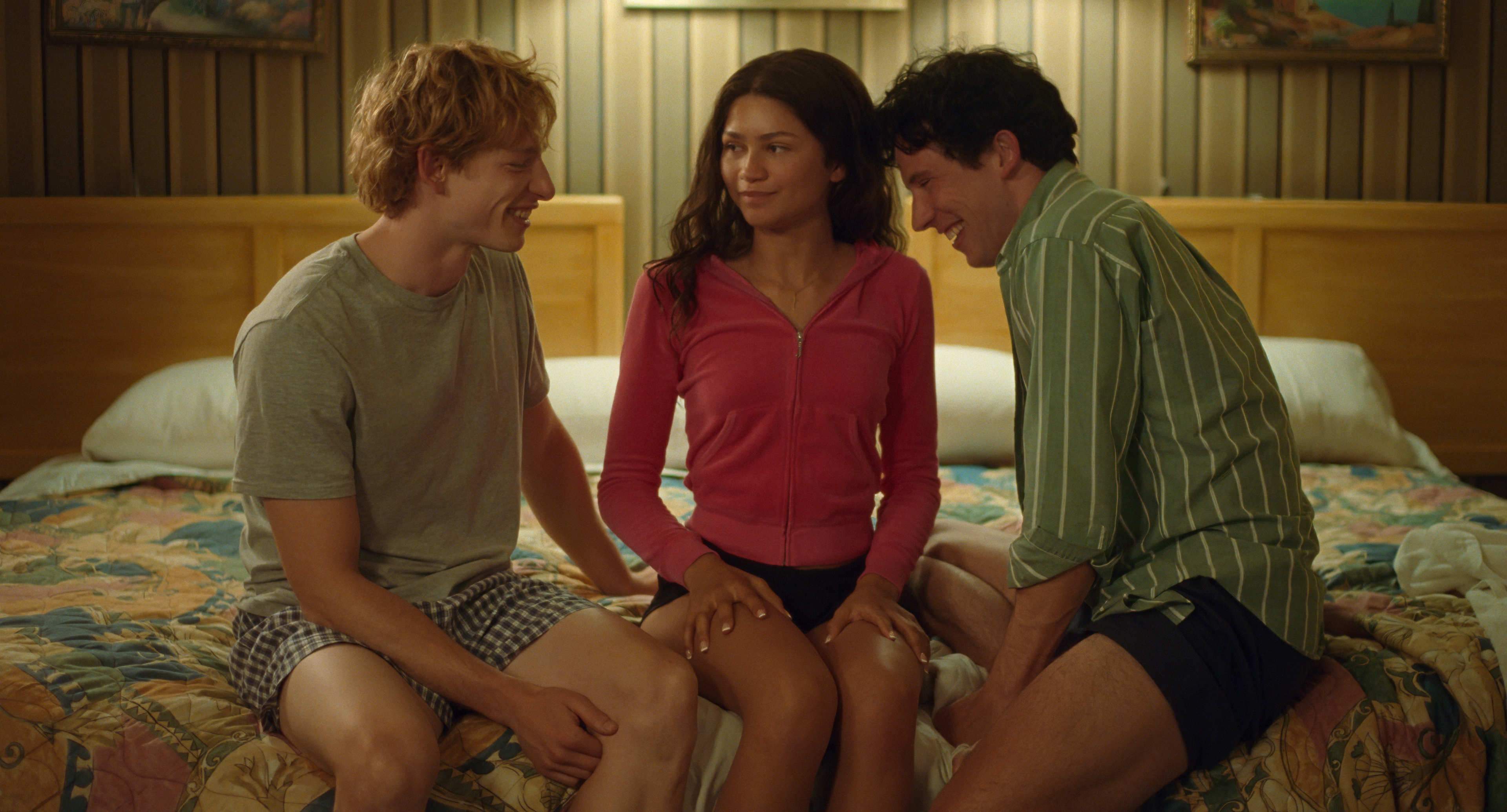
For months, we’ve been getting full court press (pun intended) for “Challengers.” Originally slated for a fall 2023 release but delayed when writers and actors went on strike for more equitable working conditions, at long last, we have arrived at what is probably the buzziest movie so far this year.
In case you’ve been living under a rock, “Challengers,” according to social media, is the “Zendaya tennis love triangle (and maybe threesome?) movie.” (We’ll get into why this is reductive in a moment.)
The movie’s marketing has relied heavily on its star power: Zendaya stars as tennis phenom Tashi, alongside Josh O’Connor (“The Crown”) and Mike Faist (“West Side Story”) as Patrick and Art, two — let’s face it — deeply mediocre white men vying for her romantic attention. “Challengers” follows the trio from when they are promising teenage tennis players, through their college years, and into adulthood. There’s a lot going for it on paper: It’s the latest film from director Luca Guadagnino, known for his visually striking romances.
When HuffPost senior culture reporters Marina Fang, Taryn Finley and Candice Frederick initially convened to discuss “Challengers” out loud, we quickly realized we had so many thoughts to lob back and forth. So we took to the court for a long match.
Our Overall Impressions
Marina: Before we get into the nitty gritty, what were your initial gut reactions to “Challengers”? I think we were all at the same press screening, and I have to say, I enjoyed that it was a big — but not too big — crowd. While I have some specific criticisms about the substance that we’ll get into, I thought it was an enjoyable big-screen experience, and I think, if anything, people will want to talk about this movie. These days, convincing people to go see a movie in the theater is a hard sell, so getting people there is already a big feat. I thought the tennis-related tension was excellent (not so much the romantic tension, which we’ll get into), and like many of Luca Guadagnino’s films, it’s visually so striking. The tennis scenes are expertly shot and choreographed, and really grab your attention. Most movies about tennis have been pretty lackluster, so that itself is noteworthy. And this is an interesting rewriting of the typical sports movie script — though again, I have some concerns about more substantive aspects of it. But overall, it’s a very fun movie experience, which is what I imagine most people are looking for with this.
Candice: I was actually pretty taken aback by how small the theater and screening was, because folks have been making such a big deal out of this movie. But it was also interesting to experience how contained the laughter and genuine uneasiness was among the audience. I thought the movie was…fine? I mean, I think the excellent camera work really made the many tennis scenes really, really exciting to watch. I kept going “And?” a lot to myself while watching the movie.
There is a lot of sexual tension and homoeroticism between the two characters played by Mike Faist and Josh O’Connor (two names I have to constantly look up, because I keep forgetting who they are — which says a lot about their memorability). Though, I do think their characters are the most interesting, and the most developed in the movie. They essentially play two tennis stars who, as much as they excel in their sport, lead actually pretty dull romantic lives. I’m totally convinced about that, though, since folks usually amplify mid-looking athletes as sex symbols simply because they’re athletes — and often because they’re also white.
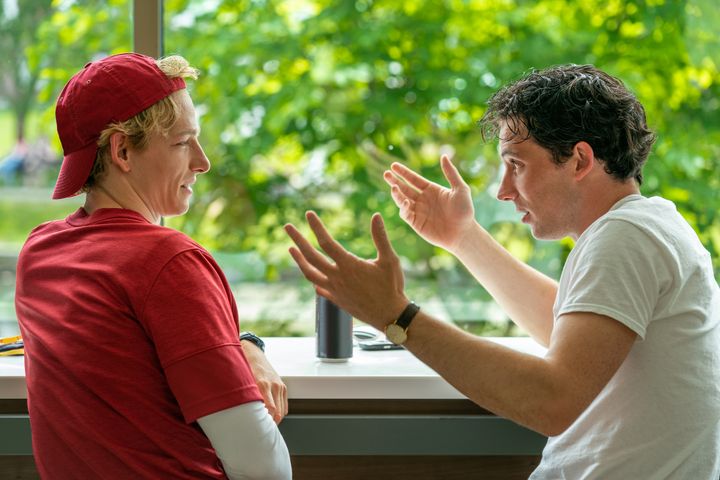
But in Luca Guadagnino’s land of make-believe, we’re just supposed to go with this. And it mostly works because these two guys are pretty unremarkable outside of tennis games. So, of course they’d both go for the “most beautiful woman I’ve ever seen” played by Zendaya. They have such interesting arcs, though. And Zendaya is just, well, the pretty girl who’s also a hardass and stuck in the middle of these two guys (neither of whom she seems to like very much). She has no interiority whatsoever. She takes advantage of their lovesickness and draws a wedge between the pair, which heightens the sexual tension among the threesome and increases the tension on the tennis courts. But we don’t really know what’s in it for her, her motivations, her story — nothing. Just more details about the guys. That bugged me.
Taryn: The marketing works because I had been interested in seeing this film for a few months before the screening, and I agree that it’s a good excuse to actually get out to the theater. I generally knew what the movie was based on, but didn’t have much of a clue what to expect other than this love triangle and Zendaya being an absolute bad bitch.
I have some gripes about “Challengers,” but overall I was entertained. I agree with you, Candice. I was surprised at how thrilling they could make tennis (they even note in the film how boring the sport can be). And a big part of that was the cinematography. I was genuinely impressed during moments when we bounced between Faist, O’Connor and the tennis ball’s POVs. That may have been the most memorable thing for me.
Candice: YES! The cinematography by Sayombhu Mukdeeprom is superb.
Marina: Bounced! Nice.
What’s Up With These Deeply Mediocre White Men?
Marina: Candice, to pick up on your point, which I totally agree with, that seems to be the central question. I understood the gravitational pull of Zendaya’s character toward these deeply mediocre white men. But I simply did not understand why she was drawn to them — and eventually marries one of them and channels her unfulfilled tennis dreams by living vicariously through his career. On the other hand, maybe that was the point, and it’s not that deep?
I really like Josh O’Connor as an actor and have enjoyed following his career and the interesting choices he has made, and I thought he was pretty good here. But I found Mike Faist so flat, which reinforced the whole question of: Why him? Why either of them?
Candice: Yeah, I’d truly like the answer to your first question: Why these guys? There is a lot of emphasis on how beautiful Tashi (Zendaya) is in the movie, and the movie tries really hard to convince its audience that these two guys are just as hot, and this potential love triangle is scorching hot. But like… I didn’t feel that heat at all, despite the many shots of the guys sweating on the court or the camera zeroing in on their abs — or even the many shots of Zendaya’s butt in short tennis shorts (I noticed this a lot and didn’t know what to make of it). Anyway, this wasn’t what was sexy to me. What had the potential to be hot was the sexual tension between the two guys, but the film never… really… goes… there. And I wish it did. That might also give me some kind of motivation for Tashi to make them better competitors. Still… Why should she care about that? Is it the money her husband would earn from that? Is she a gold digger? Does she not have her own money?
I keep focusing on the money part, because I might be trying to give Tashi some layers that just aren’t there. We know nothing about her family (her mother is white and, for much of the movie, I thought she was actually the nanny since she only appeared to take care of Tashi’s daughter). Her dad is Black and, well, that’s all we actually know about him because he only has one line, I think? But what drives Tashi? I still don’t know. And doesn’t she deserve better than these unremarkable white guys? Shouldn’t she deserve an equally hot dude?
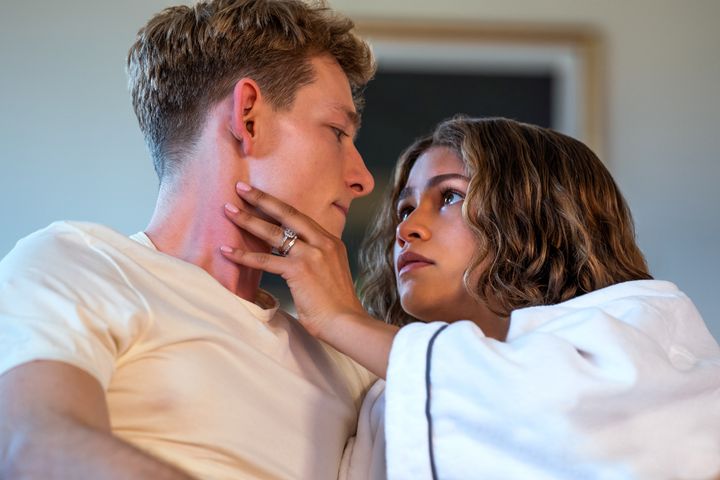
Taryn: I feel like I kind of get why them — though I do really wish we had better male eye candy for a 2 1/2 hour movie. Looks don’t move Tashi in that way. Tennis does. And though they try hard to convince us that O’Connor’s character is this suave player (girl, I guess), I read it as what these guys can do on the court is the most attractive thing about them. And why Tashi is drawn to come in between their long-standing friendship in the name of “watching good tennis,” as she tells them the day they meet.
And let’s be honest, in the real tennis world, there are plenty of mediocre-looking white men.
My bigger issue is that I love how Tashi has control over these men, but like you said, Candice, we don’t really know where this diehard love of tennis comes from other than the fact that she’s amazing at it. Tashi is supposed to be central here, but oftentimes she feels like a background character or prize these two are vying for.
Marina: Yes, Candice, it tries so hard — and I just didn’t buy it! Like I said up top, the tennis tension was riveting. The romantic tension, not so much. I was deeply underwhelmed by all of it, especially since so much of the advertising has led us to believe this is supposed to be partially an erotic thriller.
Lol, Taryn. Totally spot-on. And yes, I think the film is often trying to subvert the standard love triangle and giving her agency (“trying” being the operative word here) — but ultimately, she’s still the object of their affection, and not so much the subject of the movie.
Candice: Taryn, I do agree that Tashi gets turned on by tennis, for reasons that aren’t actually explained and would really be helpful!
Marina, YES! I think the romantic tension between the two guys would have been the much better focus. Especially since one genuinely seems very interested in the other one!
There’s A Lot Of Substance Missing From This Movie
Marina: You’ve both already expertly raised perhaps the biggest glaring hole in this movie. It’s very selective about when it chooses to reflect the real world of professional tennis — and when it does not. There are a lot of topical references, like mentions of real-life players and cameo appearances by actual tennis commentators.
The financial dynamics are there: Candice, to go back to your earlier question about money, I think Tashi does need the money because she never got to turn pro because of her injury. And as a top professional player, her husband is among the very few people who actually get to be rich through tennis. Most players — for example, like Josh O’Connor’s character — never get even close to that level, where it’s financially lucrative.
Candice: Ah, I see. But is the audience just supposed to know that or should the movie at least hint to this financial reality and, potentially, Tashi’s motivations within that?
Marina: Totally, that’s just me adding context, which, as you said, is illustrative of the problem.
But where the movie barely goes at all is race. You can’t make a movie about professional tennis and virtually never acknowledge that Tashi is a Black woman in the extremely white world of professional tennis.
Taryn: Tashi sticks out like a sore thumb in this very white world. She’s obviously Black. There’s even a point during her party early on in the film when we see she has a Black dad. It sucks, however, that “Challengers” aims to be colorblind up until the last 20 minutes of the film when Tashi says, “I’m taking such good care of my little white boys.” What’s funny enough is that that line made its way into the trailer. If it was that important of a highlight to make it to the film’s promo, then why is race put on the back burner in the film?
Instead, the filmmakers put an emphasis on class. Tashi notes that she doesn’t have the financial privilege that led Art and Patrick to tennis. That’s fair to point out, but it’s lazy to not explore the other obvious factors impacting their relationship.
Marina: Right, there are passing references to the fact that Art and Patrick went to an elite tennis boarding school/training academy, and Tashi’s family didn’t have the money — and even if they did, she says she didn’t want to be entrenched in that insular world. Later on, Tashi also implies Patrick, whose career is tanking, has some sort of trust fund or generational wealth. She tells him he should just quit because he doesn’t need the money. But as you said, Taryn, it feels like a way to avoid going any deeper.
Candice: Honestly, I think it could be that neither Luca Guadagnino nor screenwriter Justin Kuritzkes, two white men, are equipped to handle any racial nuance. As we know, white filmmakers have historically been far more invested in themes of class than race. I also don’t think they have their Black audiences in mind either. I get the impression that they made a movie they thought was hot and cast a very popular Black star in a movie that would then exceedingly fetishize her through a white male lens. And that often made me uncomfortable.
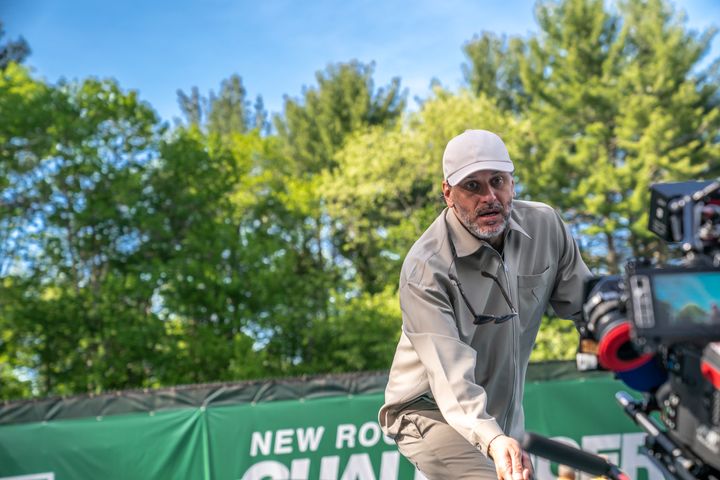
I think Zendaya does the best she can with all of this, but I think the movie ultimately fails her — and is just not interested in what she can do. There are so many moments where she rolls her eyes at these dudes (they’re both so needy and exhausting), and that’s great and makes Tashi a little more interesting. But I don’t know if that’s the direction or Zendaya. And if it’s the latter, I have to wonder why neither the filmmakers or movie seem interested in developing her beyond her reacting to the story versus being inside of it. Meaning, she’s often in the peripheral, which is strange for a lead actor.
A-ha, Taryn, I’m so glad you brought up that line about “taking care of my two little white boys.” It’s the only time in the movie where race is even brought up, and it seems so weird. Because part of the deal with colorblind casting is that race isn’t even supposed to be a concept, I thought. But then it’s brought up here and it’s like…. Um… OK? Seemed awkward to me.
Taryn: And that’s really it, Candice. They don’t have the range to really talk about race. It really is unfortunate for Zendaya and for us as an audience.
Marina: Totally, and it’s especially galling given how much the movie’s marketing relies on Zendaya’s star power. They’re really banking on her star power alone getting people to the theater — but then, the movie itself is under-serving her character.
I think I mentioned this to you both when we initially talked out loud about the movie, but the screenwriter is Justin Kuritzkes, who these days might be better known for being “Past Lives” writer-director Celine Song’s husband, whom John Magaro’s character is based on. So make of that what you will!
Candice: Yeah, Marina. Really coasting on Zendaya’s star power. And I think it’s really… something that the screenwriter is Song’s husband. Obviously, Song is Korean Canadian and Zendaya is a biracial Black American, so it’s not exactly the same. But like… Song might have still been able to help her man a bit with the racial nuance. Use your resources!
The Time Jumps May Require Some Extra Attention From Audiences
Marina: I also wanted us to talk about the structure. There are a lot of time jumps and parallel timelines going on. On screen, we get various time stamps to indicate where we are. Some of it makes sense for the narrative arc, like when the movie pairs a past event with a similar one happening in the present. Other times, there were a few too many shifts. It would have been wiser to just stick to two simple timelines: past and present. Or even just do it completely chronologically.
Taryn: I tried so hard to piece together where we were in the story, but the time jumps were really confusing.
I thought weaving together the present-day moments in Art and Patrick’s match with the related moments from their past that got them here was cool in theory. But in practice, it was a bit much. The main reason being that there were several time jumps. And there were time jumps within time jumps. I’m still piecing together what happened when.
Candice: I might be the only one who genuinely could never tell which timeline it was when they just showed O’Connor, who looked the same to me in every single era. I didn’t think there were too many time jumps, though, because it at least gave a little extra context and character that is still somehow left to be desired. But I can concede that they could and should have dropped one or two to get the movie down to two hours. There is really no need for it to be as long as it is. There just… isn’t that much story. Just more scenes.
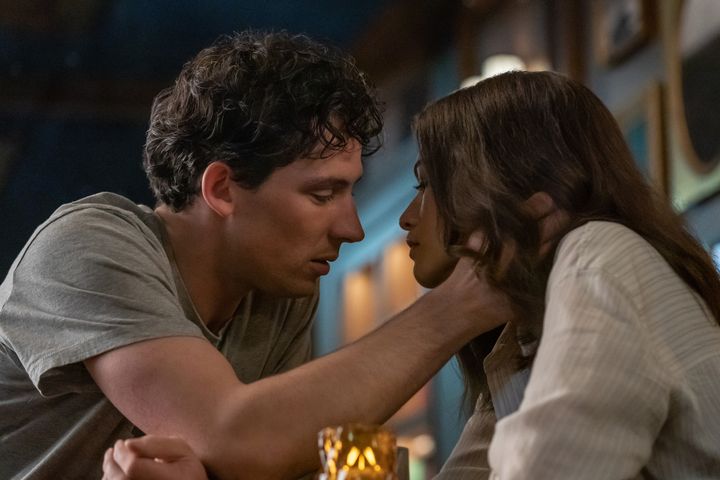
Are We In An Age Of “Made For Social Media” Movies?
Marina: Taryn, when we initially talked about this movie, I thought you brought up an astute observation about how “Challengers” — and several other buzzy movies recently — seem tailor made for memes and social media reactions. And this gets at your point too, Candice, that so much of this movie is just scenes without a story. “Saltburn” is another one that comes to mind. Maybe “Civil War” as well, though I liked “Challengers” much more than either of those. What do we make of this potential age of “made for social media” movies?
Candice: Totally agree, Marina. I think comparing it to “Saltburn” is excellent. I don’t even think “Civil War” is even interesting or absurd enough to even be a meme, however.
Marina: Haha, fair. “Civil War” is full of sound and fury, signifying nothing…
Candice: We do seem to be getting a lot of movies that are made with social media reactions in mind. Like, throw a weird scene in there or a funny line. Or some of them that social media folks are already debating about and the movie goes triple platinum… at least on the social media streets. But is there anything else here besides a lot of popular or buzzy people or scenes? No, not really. I think we really need to demand more from movies, honestly. They can’t just cater to our sensibilities or hashtags. That’s not a movie. That’s a tweet. We should be able to discern the difference.
Taryn: I love some good online discourse, but we’re putting the carriage before the horse here. I get that social media is the new “word of mouth” and studios heavily rely on it for promo, but it’s becoming insufferably corny.
“Challengers” will get think piece threads and TikTok edits that highlight the way Tashi has these men wrapped around her fingers, romantic relationships getting in the way of friendships, and who’s “husband material” or not. I’m already cringing.
Marina: I’m of two minds here: On the one hand, it is fun when a movie gets people talking and having a spirited conversation, whether it’s online or IRL. We don’t have a whole lot of those cultural watercooler moments right now. But as you’ve both said, it does us all a disservice when it’s mostly devoid of substance and feels purely commercial.
Candice: Yeah, I think social media is essential to film marketing these days as is the online discourse. But that doesn’t mean that the movie no longer has to be good. I think what often happens is that if a movie (or even a TV show, for that matter) garners a lot of chatter online, it’s considered good. And the two things sometimes don’t mean the same.
Marina: Something you say a lot, Candice, that I really appreciate is: When people talk about a movie and create discourse and write think pieces on it, it’s often them projecting some substance that isn’t actually there. It’s often not that deep! People are just searching for depth that isn’t there, which maybe says a lot about where many of these big Hollywood productions are these days.
Candice: It also says a lot about our bar for quality. I think even something that we as journalists have to think about is what we’re projecting onto a movie versus what the movie is actually giving us. We’re all human and bring our own experiences to art. But at some point, we really do need to ask ourselves: What’s actually happening in the movie?
Taryn: That really is the moral of the story, Marina. It’s not that deep.
“Challengers” opens in theaters Friday.
Disclaimer: The copyright of this article belongs to the original author. Reposting this article is solely for the purpose of information dissemination and does not constitute any investment advice. If there is any infringement, please contact us immediately. We will make corrections or deletions as necessary. Thank you.
